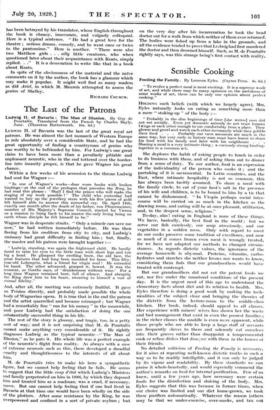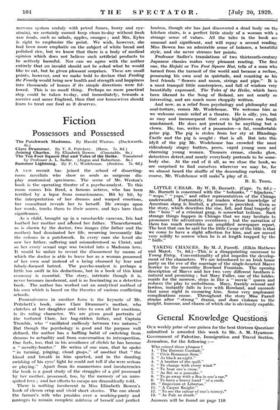Sensible Cooking
Feeding the Family. By Leonora Lyles. (Cayme Press. 4s. 6d.) " To evolve a perfect meal is most exciting. It is a supreme work of art, and while there may be many opinions on the usefulness of some works of art, there can be only one opinion about perfect cooking."
HOLDING such beliefs (with which we largely agree), Mrs. Eyles naturally looks on eating as something more than a mere " stoking-up " of the body :— " Probably in the dim beginnings of time [she writes] men did not eat socially. Even yet domestic animals do not trust human te:ngs or each other enough to eat comfortably from a plate. They glower and growl and watch each other incessantly while they gobble their food . . . Probably our cave ancestors ate much in the same way, but very early in history man must have learnt to share his food with his family and later with his neighbours . . . Sharing a meal is a very intimate thing ; a curiously strong binding- together in a common act.
She deplores the habit of asking people to lunch in order to do business with them, and of asking them out to dinner from a sense of duty. To our author, food is an expression of the individuality of the person who cooks it ; and the partaking of it is sacramental. In Latin countries, and the East, where intimate hospitality is not so common, this has always been tacitly assumed. To share a meal with the family circle, to eat of your host's salt in the presence of his wife and children, is to be bound to him by a tie that cannot be dishonoured. " In Utopia perhaps social inter- course will be carried on as much in the kitchen as the drawing room, and eating will be at once pleasant, utilitarian, and, in the deepest sense, religious."
To-day, alas! eating in England is none of these things. We have, basically, the best food in the world ; but we serve our fish carelessly, our soup atrociously, and our vegetables in a sodden mess. Only with regard to meat do our cooks preserve some tradition of excellence, and now so much of it comes frozen even meat is wrongly treated, for we have not adapted our methods to changed circum- stances. As regards dietetic values, the ignorance of the average housewife is abysmal. Proteins, vitamins, carbo- hydrates and starches she neither kr.3ws nor wants to know, considering them fads that our grandmothers would have treated with contempt.
But our grandmothers did not eat the patent foods we eat, nor live under the unnatural conditions of the present day. It is the urgent need of this age to understand the elementary facts about diet and its relation to health. Mrs. Eyles therefore is doing a good work by making the tech- nicalities of the subject clear and bringing the theories of the dietetic from the lecture-room to the middle-class kitchen. Her book, indeed, should appeal to all classes. Her experience with miners' wives has shown her the waste and bad management that exist in even the poorest families ; in the richer classes the muddle is even more apparent, while those people who are able to keep a large staff of servants are frequently slaves to them and solemnly eat ourselves into their graves rather than disappoint a temperamental cook or refuse dishes that disagree with them in the houses of their friends.
No detailed criticism of Feeding the Family is necessary, for it aims at repeating well-known dietetic truths in such a way as to be readily intelligible, and it can only be judged by its vigour and readability. By these standards we can praise it whole-heartedly, and would especially commend the author's remarks on food for internal purification. Few of us knew, until a few years ago, how necessary were certain foods for the disinfection and sluicing of the body. Mrs. Eyles suggests that this was because in former times, when our choice was limited and our diet home-grown, we took these purifiers automatically. Whatever the reason (others may be that we under-exercise, over-smoke, and tax mix nervous system unduly with petrol fumes, hurry and eye- strain), we certainly cannot keep clean to-day without fresh raw foods, such as salads, apples, oranges ; and Mrs. Eyles is right to emphasize the point. We wish, however, she had been more emphatic on the subject of white bread and polished rice, but we know that there is a body of medical opinion which does not believe such artificial products to be actively harmful. Nor can we agree with the author entirely that an invalid should not be asked what he would like to eat, but be given pleasant surprises. These are small points, however, and we make bold to declare that Feeding the Family would bring new health and strength and happiness into thousands of homes if its simple directions were fol- lowed. This is no small thing. Perhaps no more practical step could be taken to-day, and immediately, towards a merrier and saner England, than that our housewives should learn to treat our food as it deserves.

















































 Previous page
Previous page